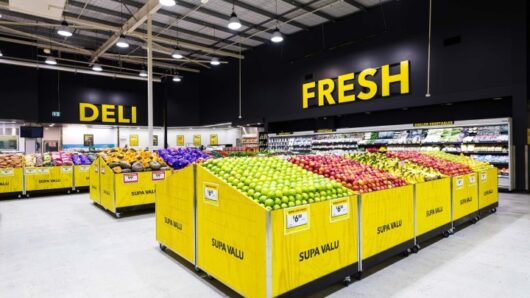A programmer by background, Tower Systems founder Mark Fletcher (pictured above) started creating software for small retailers in 1981. The earliest version was to manage newspaper home delivery, connecting newsagents with publishers and enabling the list and instructions that paper boys would use to make deliveries.
In 1996 Fletcher branched out into retail ownership, buying his first newsagency as a testbed to experiment with the software and “walk in the shoes of our customers”. Today, Tower Systems has three stores, two transitioning into giftware. He also bought a newsagency marketing group called newsExpress, which is helping about 200 newsagents transition their businesses and find relevance in 2024 and beyond.
Tower Systems’ software is targeted to each of 16 different vertical markets in Australia and New Zealand, including gift shops, toy shops, jewellers, garden centres, bike shops, pet stores, and sewing shops.
Inside Retail talked to Fletcher about how small local retail businesses can prosper in an era where in many categories they are under increasing pressure from multinational companies and category killers.
Inside Retail: Is the era of the newsagent over in Australia?
Mark Fletcher: “Australia once had about 4000 newsagencies and is now down to about 2800 with around 10 per cent closing every year. The smart newsagents don’t trade as newsagents anymore. Some are focused on gifts and homewares, a lot have got into really good barista coffee, and others are doing outdoors, camping, fishing and those sorts of products. So they’ve still got their core – magazines and newspapers – but they’re doing these other things that are giving them purpose. The channel is still alive, but not in the way that you would identify as a singular channel anymore.
“The ones that are doing well are those that have embraced change and innovated. One of my shops has a relationship with the Royal Australian Mint and is selling more than $500,000 a year in mint coins online. That’s a plug-on business that runs at the back of the shop, and it makes that shop more relevant. That’s what I mean about really being flexible as to how you change those businesses.
Tower Systems focuses on independent retailers, as opposed to big business. Talk me through how important small indie retailers are today and whether they are still under threat.
“They are under threat. The primary threat to local independent retail is the politicians who go to elections saying small players are the backbone of the country. Then they get elected and do nothing for them. So that’s the threat: that independent retailers are being talked about but not helped.
“We focus on independent retail for a selfish reason. I realised early on that I didn’t want to rely on a big customer that could dominate my software company. I’d rather have many smaller customers because I was able to serve them well by staying within their various verticals. By not being beholden to big businesses, we don’t have a really big voice in the room guiding our changes.
“We are a very democratic company. When it comes to software changes, we have had a platform on our website called Software Ideas for about 15 years. Any of our customers can put up an idea for a software change, other customers can see that and vote on it. Around half of our software enhancements come from that democratic suggestion and voting process. It’s a very transparent process, and giving our customers more power over the enhancements in the software has helped us create better software.
It sounds like you have created almost like a culture or an organisation by default.
“It is. And the conversation is not just about technology. For example, when Australia’s inflation numbers came out, it was a little higher this quarter than they expected. So there is all this talk around how we’re going to differentiate the businesses. The conversations our customers are having with us aren’t just about the software, they’re also about business ideas because all of our needs are very similar.
“Pet shops in Australia are undergoing the most significant seismic change that we’ve seen in the history of pet retailing right now. Bunnings has introduced a pet aisle in all of its hardware stores. Woolworths has bought out Petstock which was previously a group of independently owned local pet stores. These are all a part of normal business change, but the local pet shops are struggling to figure out how to deal with that. So as well as software, we can talk with them about options. It’s a community where we’re very supportive of each other.”
So, how can these little guys prosper in the shadow of these big chains? How can the little pet shop, for example, survive and grow?
“That’s a million-dollar question. First of all, they’ve got to understand that they’re no longer defined by their shingle. People who own a pet shop or a jeweller, for example, think they can only sell what should be under that shingle of jeweller or pet shop, but that’s not true. These small local retail businesses can sell almost anything. They need to look at their businesses with flexibility and use their data to understand how broadly they can take their businesses. They need to move online – which we can help them do – and they need to start to be smart about how they run their businesses.
“For example, around 25 per cent of retail businesses are out of stock of their top-selling items for at least 30 to 40 per cent of the time. They’re not ordering frequently enough and they are out of inventory before they can sell it. Our software helps them resolve that. The other issue is that typically, around 20 per cent of all inventory on the shop floor is dead. It’s not performing, so we help them identify that and quit it.
“How can they survive? First of all, by running better businesses: Get your foundations right. Secondly, expand beyond your shingle. And then thirdly, you’ve got to be smarter online. A lot of these businesses, when they go online think oh, I’ll just put my pet shop online. It might be smarter for them to take a niche part of their business online and specialise in that. So their online presence is their plan B, and their shop is their plan A – they have two separate businesses, but both are connected. We can help them strategically, structurally and technically to do those things.
“This is the type of conversation a small business retailer might not have had before. Typically, they won’t have it with their accountant, but we’re able to engage in those things and kind of play in that space with them.”
Can you expand on the website idea there? Like, if you’re a pet shop, for example, should you just focus on cats or dogs, or do something different?
“We have some data from the Australian Bureau of Statistics that shows, for example, an average dog owner in Australia will spend around $3300 a year on their dog – not just on food and veterinary care, but on things like fashion. So we have one client that has decided to focus on high-end fashion for pooches. It sells $200 and $300 outfits for dogs and because there aren’t a lot of shops selling that, they can reach people anywhere in the world.
“A lot of pet shops – when they think about going online – the first thing they think of is: I’m going to put pet food online. And I say: A lot of people are doing that, so look for something different.
“We’ve got a bike shop customer who wanted to go online and wanted to do something very different. I said: Why don’t you focus on nutrition? Because if a cyclist is going on a 25km ride, they need some nutrition that they can put in their backpack and take with them. So why not focus on that and consider offering it under subscription, because cyclists cycle pretty regularly?
“Rather than doing what is expected of your business, look for that ‘green shoot’ niche that you can engage in that’s going to differentiate your business.”
How do you offer these consulting services? Is it a separate business initiative or just part of the broader software solutions service?
“It’s part of our relationship with our customers. We don’t we don’t charge for any services. We will engage as much or as little on the business side as our retail customers want. We have customers who send us their data and say, can you look at my business for me and let me know what you see? We very happily do that. Almost everybody on our help desk has retail experience, so they’re able to have different levels of this type of conversation with retailers, too.”
How can technology help deliver these points of difference among these little retailers and drive growth and differentiation?
“First off, it will tell them what’s working, what’s not, and where they might be missing out. We have an insights dashboard that sits within our software which gives them insights from their data and identifies actionable things that can be done within their businesses.
“Software also improves the stickiness between retailers and suppliers. We have retailer-supplier relationships today, where our software tracks the sales, and lets the suppliers know as the day unfolds, so suppliers can get inventory there just in time. So we’re giving small business retailers the things that big business retailers are used to, and helping both sides of the relationships work well. We also make it very easy for retailers to get the lowest possible eft-pos fees. We’re sitting currently at 1 per cent which from an industry perspective, is very competitive.
What about in terms of customer relationships and data helping them understand their customers?
“We do a lot of work around the customer relationship side, whether it’s understanding the frequency of purchase, or what they’re purchasing. With a jeweller, for example, you’ve got the family structure, when the engagement was, when the wedding was, their children, their birth dates. All that information helps the jeweller target market based on anniversaries and other special dates that are coming up.
“You can also link back to external sources, whether it’s through MailChimp or a CRM solution for example. The challenge in small business retail is that often they are not as smart as they should be about it. They should be doing more highly personalised and targeted marketing. Our software can help them do it, but they’ve got to want to do it to make that happen.
A final piece of advice to retailers in the current climate?
“Business owners can feel that the world is against them – costs are going up, wages going up, rents are going up. Within our company, our approach is to remind everyone that it is often not as bad as you think.
“Let’s be optimistic, and let’s look for positive steps we can take, rather than dwell on all the negativity.”






